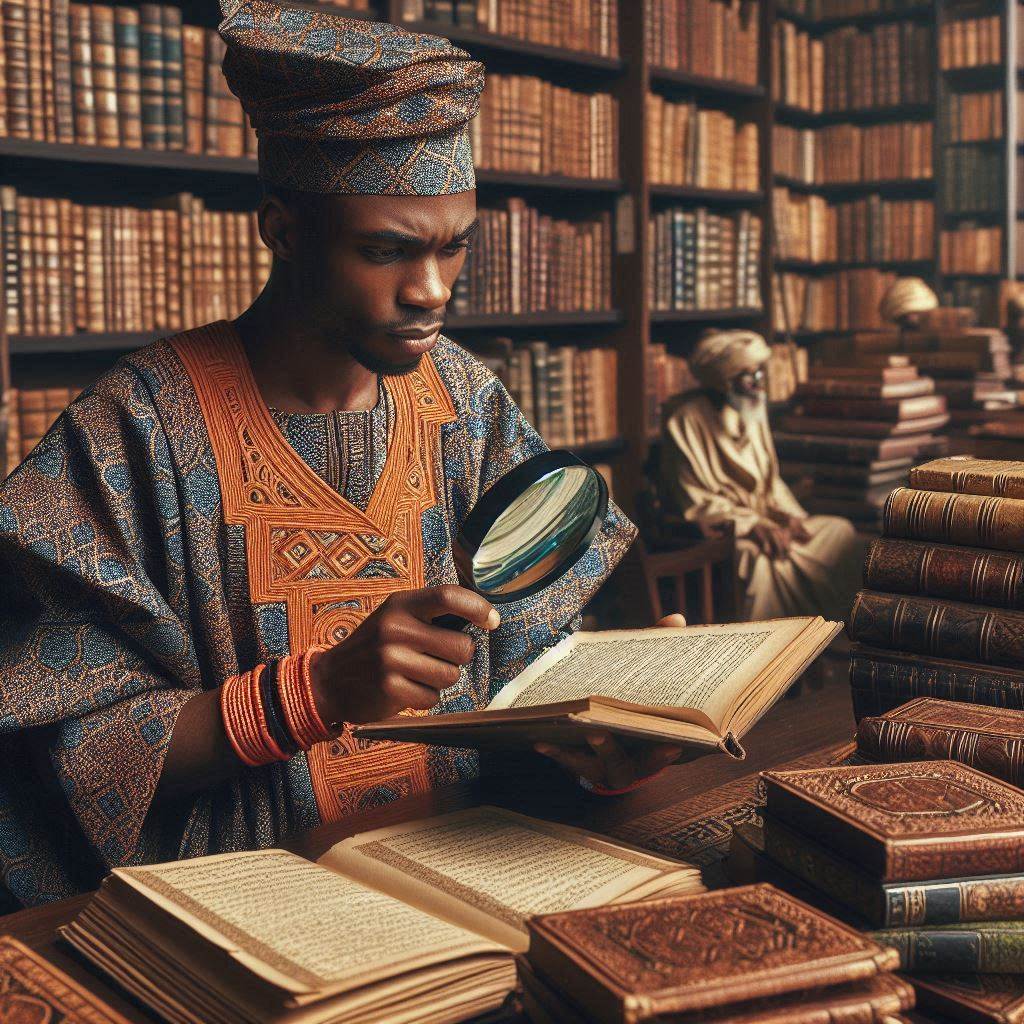Introduction
Historical preservation and archival science are crucial in Nigeria to safeguard its rich cultural heritage.
Importance of Historical Preservation in Nigeria
Preserving historical documents and artifacts helps to maintain a sense of identity and heritage.
It allows future generations to learn about the past and understand the evolution of Nigerian society.
Archival science ensures that valuable records are properly organized, stored, and accessible for research.
Challenges Facing Historical Preservation in Nigeria
Lack of funding and resources hinder efforts to preserve and protect historical sites.
Inadequate infrastructure and training for archival professionals create obstacles in managing historical records.
Rapid urbanization and development pose a threat to the preservation of traditional architecture and cultural landscapes.
History of Archival Science in Nigeria
Archival science in Nigeria has a rich history that dates back to the pre-colonial era.
Overview of Development
The development of archival science in Nigeria can be traced back to the early 20th century.
The British colonial administration played a significant role in the establishment of archival institutions in the country.
The Nigerian National Archives, established in 1954, marked a major milestone in the development of archival science in Nigeria.
Key Milestones
- Establishment of the Nigerian National Archives in 1954.
- Creation of State Archives in various states across the country.
- Introduction of modern archival practices and standards.
- Integration of digital archiving technologies in preserving historical records.
Importance of Preserving Historical Records
Preserving historical records is crucial for documenting the rich heritage and cultural diversity of Nigeria.
Historical records serve as primary sources for researchers, historians, and policymakers.
Preservation of historical records ensures that future generations have access to authentic information about Nigeria’s past.
Archival institutions play a vital role in safeguarding and promoting Nigeria’s cultural heritage.
To summarize, the history of archival science in Nigeria reflects the country’s commitment to preserving its rich cultural heritage for future generations.
Read: Internship Opportunities for Communication Arts Students
Challenges facing historical preservation in Nigeria
Lack of funding for archival institutions
Historical preservation efforts in Nigeria are often hampered by limited financial resources.
Archival institutions struggle to secure adequate funding for the maintenance and digitization of historical records.
Inadequate infrastructure for preserving and digitizing historical records
The lack of modern facilities and equipment poses a significant challenge to the preservation of historical documents in Nigeria. Without proper infrastructure, it becomes difficult to properly store and digitize these records.
Risk of deterioration and loss of important historical documents
Many historical documents in Nigeria are at risk of deterioration due to poor storage conditions and lack of preservation efforts. Without proper care and attention, these valuable records may be lost forever.
Lack of awareness and appreciation for the value of historical preservation
There is a general lack of awareness among the Nigerian population about the importance of preserving historical records.
Without a strong sense of appreciation for the value of these documents, efforts to preserve them may not receive the necessary support.
Overall, these challenges highlight the urgent need for increased investment and awareness in historical preservation efforts in Nigeria.
Without adequate funding, infrastructure, and appreciation for the value of historical records, the rich history of the country is at risk of being lost to future generations.
Read: Impact of Communication Arts on Nigerian Media
Role of archival science in preserving Nigeria’s cultural heritage
Importance of preserving cultural artifacts and traditions
Preserving cultural artifacts and traditions is crucial for maintaining the identity and history of a nation.
Archival science plays a significant role in safeguarding these artifacts by documenting, cataloging, and preserving them for future generations.
This preservation ensures that the unique cultural heritage of Nigeria is not lost or forgotten over time.
By preserving these artifacts, societies can learn from the past and understand the evolution of their traditions and customs.
Additionally, the preservation of cultural artifacts can help promote tourism, attract visitors, and boost the local economy.
Impact of archival science in promoting cultural preservation and identity
Archival science helps in promoting cultural preservation by providing a systematic approach to managing and preserving cultural materials.
Through proper documentation and storage, archival science ensures that cultural artifacts are protected from damage, theft, or loss.
This preservation leads to a better understanding of Nigeria’s rich cultural diversity and heritage among its citizens and the global community.
Archival science also aids in reconnecting communities with their past, reinforcing a sense of identity and pride in their cultural heritage.
By preserving cultural materials, archival science contributes to nation-building and promoting unity among diverse ethnic groups in Nigeria.
Examples of successful preservation projects in Nigeria
One successful preservation project in Nigeria is the National Archives of Nigeria, which serves as a repository for historical documents and records.
The National Commission for Museums and Monuments is another key institution that oversees the preservation of cultural artifacts and heritage sites in Nigeria.
The Nigerian Film Corporation has also played a significant role in preserving and promoting Nigerian cinema, a vital cultural aspect of the country.
In addition, various cultural festivals and events, such as the annual Durbar Festival in Kano, showcase and celebrate Nigeria’s cultural traditions and heritage.
These successful preservation projects highlight the importance of archival science in safeguarding Nigeria’s cultural heritage and promoting cultural identity.
Read: Communication Arts: Job Prospects and Salaries

Digital preservation and its role in archival science
Digitizing historical records is crucial for easier access and preservation in Nigeria.
Transform Your Career with Expert Guidance
Get personalized mentorship consulting that’s tailored to your unique path. Our expert advice is actionable and exclusive.
Get StartedAdvantages of digitizing historical records for easier access and preservation
- Digital copies can be accessed remotely.
- Preservation of fragile and deteriorating physical records.
- Facilitates sharing and dissemination of information.
Challenges of digital preservation in a country with limited resources
- Lack of funding for technology and infrastructure.
- Limited technical expertise in digital preservation.
- Power outages and unstable internet connectivity.
Potential solutions for improving digital preservation efforts in Nigeria
- Collaboration with international organizations for funding.
- Training programs to enhance technical skills.
- Investing in reliable power sources and internet connectivity.
Read: Famous Nigerian Alumni of Communication Arts Programs
Collaboration with International Organizations for Historical Preservation
Collaborating with international organizations is crucial for historical preservation in Nigeria.
Partnerships with international institutions allow for the sharing of knowledge and resources.
Through collaboration, Nigeria can benefit from the expertise and experience of organizations from around the world.
Examples of Successful Collaborations in Preserving Nigeria’s Historical Heritage
- The partnership between the National Commission for Museums and Monuments in Nigeria and UNESCO.
- Joint efforts between Nigerian universities and foreign archival institutions like the British Library.
- Collaboration between local historians and international research teams in documenting Nigeria’s history.
Ways in Which Nigeria Can Benefit from International Expertise in Archival Science
- Access to advanced preservation techniques and technologies used by leading international institutions.
- Training opportunities for Nigerian archivists and historians to enhance their skills and knowledge.
- Exposure to best practices in cataloging, digitization, and conservation of historical records and artifacts.
- Increased visibility of Nigeria’s historical heritage on the global stage through collaborative projects and exhibitions.
- Support in creating comprehensive archival databases and repositories to make historical materials more accessible to researchers and the public.
Initiatives for Promoting Historical Preservation in Nigeria
Government policies and initiatives for promoting historical preservation
The Nigerian government has taken steps to preserve its history by establishing agencies like the National Commission for Museums and Monuments.
They have also enacted laws to protect historical sites and artifacts, such as the Antiquities and Monuments Act.
Funding is allocated to support the maintenance and restoration of heritage sites across the country.
Incentives are provided to private organizations and individuals who contribute to the preservation of historical landmarks.
Role of educational institutions in training professionals in archival science
Universities and colleges offer courses in archival science and related fields to equip students with the necessary skills.
Internship programs are available for hands-on experience in preserving and managing historical documents.
Research centers collaborate with educational institutions to conduct studies on historical preservation methods.
Scholarships and grants are provided to students pursuing careers in archival science to encourage interest in the field.
Advocacy efforts for raising awareness about the importance of historical preservation
Non-profit organizations and cultural institutions organize campaigns to highlight the significance of preserving Nigeria’s history.
Public lectures and seminars are held to educate the community on the value of maintaining historical records and artifacts.
Collaborations with media outlets help spread awareness about the need to protect and conserve cultural heritage.
Community engagement programs involve local residents in activities that promote the preservation of historical sites.
By implementing these initiatives, Nigeria can safeguard its rich history for future generations to appreciate and learn from.
Delve into the Subject: Influential Nigerian Anthropologists You Should Know
Case studies of successful historical preservation projects in Nigeria
In Nigeria, there are several remarkable historical preservation projects that have made a significant impact on the country’s cultural heritage and national identity.
These projects offer valuable insights and lessons for future preservation efforts. Let’s delve into some case studies of successful historical preservation projects in Nigeria and explore the individuals or organizations behind them.
The National Commission for Museums and Monuments (NCMM)
The NCMM is a government agency in Nigeria responsible for the preservation and promotion of the country’s cultural heritage. With numerous museums and monuments under its purview, the NCMM plays a crucial role in safeguarding Nigeria’s history.
The agency has implemented various preservation projects, such as restoration efforts on historic sites, digitization of archival materials, and community engagement initiatives.
These projects have not only preserved Nigeria’s rich history but have also helped in raising awareness and promoting cultural heritage among the citizens.
The Benin Bronzes Repatriation Project
One of the most significant preservation projects in Nigeria is the Benin Bronzes Repatriation Project, led by various cultural organizations and international institutions.
The project aims to return looted artifacts, known as the Benin Bronzes, to their rightful home in Benin City, Nigeria.
These artifacts hold immense cultural and historical value for the people of Benin, and their repatriation is crucial for preserving Nigeria’s heritage.
The project has sparked conversations on the importance of restitution and the repatriation of cultural objects to their countries of origin.
The Nigerian National Archives Project
The Nigerian National Archives Project is another example of a successful preservation initiative in the country.
This project focuses on digitizing and cataloging historical documents, photographs, and audiovisual materials to ensure their long-term preservation and accessibility.
By making these archival materials available online, the project has enabled researchers, students, and the general public to explore Nigeria’s history and heritage.
The Nigerian National Archives Project serves as a valuable resource for studying the country’s past and preserving its cultural legacy.
The Zaria City Walls Restoration Project
The Zaria City Walls Restoration Project is a collaborative effort between the government, local communities, and heritage preservation organizations to protect and revive the historic city walls of Zaria.
These walls are significant landmarks that date back to the 11th century and are part of Nigeria’s UNESCO World Heritage Sites.
The restoration project involves conservation work, community engagement programs, and educational initiatives to raise awareness about the walls’ historical importance.
By preserving the Zaria City Walls, the project promotes cultural heritage and reinforces national identity.
To sum it up, the successful historical preservation projects in Nigeria demonstrate the importance of safeguarding the country’s rich heritage and promoting cultural identity.
Through the dedicated efforts of organizations and individuals, these projects have had a lasting impact on preserving Nigeria’s history for future generations.
By learning from these successful preservation initiatives, Nigeria can continue to protect its cultural legacy and promote a sense of national pride.
You Might Also Like: How Nigerian Arts Shape National Identity
You Might Also Like: Criminology Student Experiences in Nigeria
Conclusion
Historical preservation and archival science play a crucial role in Nigeria.
They safeguard the nation’s rich history and cultural heritage.
Preserving historical documents and artifacts is essential for understanding Nigeria’s past.
It helps future generations learn about their roots and identity.
The government, organizations, and individuals must prioritize historical preservation efforts.
Without these efforts, valuable historical records risk being lost or damaged.
The government’s role is critical.
It should allocate funds and resources to establish and maintain archives and museums.
Organizations, both local and international, can provide support through funding and expertise.
Individuals can contribute by donating historical items and spreading awareness about the importance of preservation.
A collective effort is necessary to ensure a vibrant and sustainable future for Nigeria’s historical preservation.
By working together, we can protect and celebrate Nigeria’s diverse and rich cultural heritage.
This unified approach will strengthen national pride and identity, ensuring that Nigeria’s history remains vibrant and accessible for generations to come.




